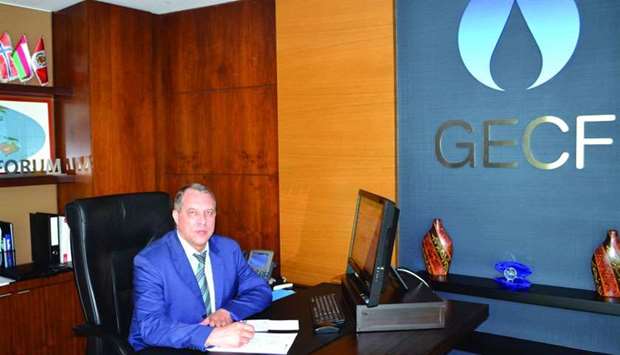*GECF chief Yury Sentyurin says member countries expected to bring in more than 60mn tonnes of LNG per year
Top LNG exporter Qatar and other leading GECF member countries are expected to bring in more than 60mn tonnes per year (mtpy) of new liquefied natural gas capacity, starting 2022 or 2023, said Gas Exporting Countries Forum secretary general Yury Sentyurin.
“We are confident the new LNG projects of the GECF member countries are expected to take final investment decisions (FIDs) and bring in more than 60mn tonnes per year of new capacity, from 2022 or 2023. This new LNG supply from GECF member countries will be able to respond to the growing global LNG demand,” Sentyurin said in an interview with Gulf Times.
Among the most likely LNG projects expected to come from GECF member countries, Sentyurin said: “We can mention Qatar’s 23mn tonnes per year (mtpy) LNG project fed by the North Field gas, Russia Arctic LNG2 (19.8 mtpy), Far East LNG (6 mtpy) and Sakhalin-2 Train 3 (5.2 mtpy), all expected to take final investment decision over 2018-2019.
Many experts in the global gas markets foresee an LNG deficit by the middle of the next decade due to the lack of FIDs on LNG projects over the past few years.
Asked what the GECF was doing to capitalise on the opportunity to develop LNG export projects to meet global LNG demand, Sentyurin said: “Firstly, it is worth mentioning that the lack of investment in the entire gas value chain has been attributed to several challenges facing gas producers and exporters. Some of these challenges include the crash in oil and gas prices in 2014 that reduced the revenue stream of oil and gas companies, thus affecting investment in the sector.
“In addition, the preference of LNG buyers for shorter-term contracts has impacted developers from securing funding from banks for LNG export projects, and the strategies of some international banks not willing to fund some projects of the oil and gas sector.”
Moreover, he pointed out “sanctions against some GECF countries have created an additional challenge to raise funds from international banks, which are reticent considering the subsequent country and credit risks, despite the creditworthiness of such member countries.”
Sentyurin revealed that GECF heads of state have expressed their “deep concern and objection to such unilateral economic sanctions” in the gas sector that are not authorised by the United Nations.
GECF member countries, he said, “have found alternative solutions” to finance their projects as scheduled, through their partners over the world and through adequate mechanisms.
Furthermore, GECF has engaged its member countries through co-operation and collaboration to share ideas and best practices as a way to overcome these challenges to create an environment for adequate investments.
“Co-operation has always been an important objective and a core value of GECF,” Sentyurin said and noted the GECF Secretariat had organised a workshop earlier on co-operation in joint investments amongst member countries.
“The outcome of the workshop is promising for further co-operation to boost the development of our gas resources,” Sentyurin said.


